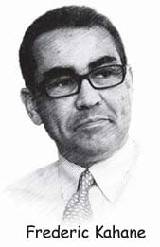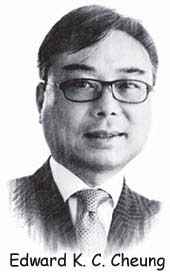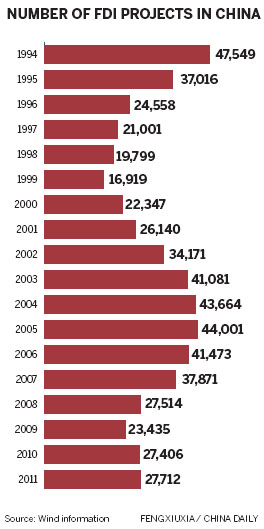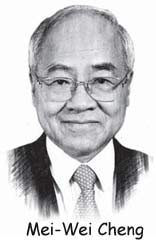|

|
|
Editor's note:
The 18th National Congress of the Communist Party of China begins on Nov 8. It will usher in the country's new leadership lineup and will in all likelihood have an important influence on economic development into the next decade - including the market environment for international corporations operating in China. In the run-up to the congress, China Daily conducted a survey of international companies on the event and their expectations for the country. The survey contained five questions.

|
|
|


In the aviation sector, the Chinese market remains extremely dynamic. With the need for air travel surging over the last 15 years, the growth of this market will remain strong in years to come. Today, domestic travel accounts for 85 percent of the total traffic in China, but this will undoubtedly evolve in favor of international traffic. Despite a gloomy economic situation in Europe, Air France, like KLM, continues to invest in China. As such, in April Air France inaugurated the first air link between Wuhan and Europe, offering services three times a week, following the opening of routes to Hangzhou in 2010 and Xiamen in 2011. It is not typical for an airline to open three new destinations in the same country over a span of three years, so it is obvious that China remains a strategic market for Air France-KLM. The Chinese market represents a challenge for the future and our ambition is to become the leading European company in the country and the preferred airline of Chinese customers.

Like other companies, we suffer from high fuel prices, which obviously affect the long-haul flights particularly, and we therefore are mindful of the implementation of a bonded fuel policy, especially in the secondary cities. In addition, we remain highly concerned about the rising operating costs at various airports as well as those of service providers.

Apart from our nine destinations in Greater China, Air France-KLM will continue to watch closely the fast-development of secondary cities, which we believe will generate a great deal of traffic growth toward Europe. Recent examples are Hangzhou, Xiamen and Wuhan, which are seeing the emergence of first-time travelers (to Europe). With seven destinations in the Chinese mainland, Air France-KLM is already well positioned in the market, and we are now working to consolidate these destinations. Also, our development in China, especially in secondary cities, will be pursued with our Chinese partners - China Southern, China Eastern and Xiamen Airlines, which will join the SkyTeam alliance on Nov 21. Thanks to partnerships such as these, we are offering 26 Chinese destinations this winter through code-share services with China Southern and China Eastern, connecting to our Paris-bound flights.

Chinese airports are not yet real hub platforms for connections, especially between domestic services, representing 85 percent of China's air traffic, and international flights. With our partners China Southern, China Eastern and Xiamen Airlines, we aim to develop more connecting traffic by putting in place a smooth transfer for our customers. It is a process that involves not only airlines and airports, but also customs, immigration and quarantine. There is still much to do in this area, and the development of flight connections also requires an improved situation in terms of punctuality.

Indeed, we are aware of the important leadership transition at the end of 2012 and early 2013. In 1966, Air France was the first European airline to serve the People's Republic of China, two years after the establishment of diplomatic relations between the countries. This long history has enabled us to build excellent cooperation with the Chinese authorities, and particularly the Civil Aviation Administration of China. We are confident that we will continue in the same direction. Besides, the 12th Five-Year Plan (2011-15), mapped out by the CAAC in April 2011 with five priorities - namely, continued safety improvements, the development of airport resources and optimization of air-traffic control, traffic growth reaching 450 million passengers in 2015 (an increase of some 13 percent) the emergence of general aviation, and the reduction of energy and carbon dioxide emissions - will ensure continuity in the context of the upcoming change. Air France-KLM counts on joining the effort and contributing to these priorities.
----- Frederic Kahane,
general manager, Air France-KLM, Greater China
|
|


Indeed, China's economy has slowed down quite a lot. But in my view this is partially caused by the sluggish international demand so that China's exports have decreased dramatically, despite the seasonal rise in September or so. On the other hand, this was the intention of the macroeconomic control measures implemented by the government since the end of last year. What disturbs me is that the economy has declined a littler faster than expected. Nevertheless, I don't expect a hard landing.
On the contrary, I have every reason to believe that China's economy will continue to grow at a relatively rapid pace, but maybe not at 10 percent, as during the past decade.
First, the urbanization process is far from finished. The current urban ratio is slightly above 50 percent. If it is going to be 80 percent, China still has to urbanize more than 25 percent of the population at least, something like 300 million people. This will generate higher demand for housing, transportation, household appliances and other items.
Second, China's industrialization process is not yet complete. There are still many cities that need to improve their infrastructures, such as building subways and new airports, enlarging railway stations and making the highway networks denser, not to mention new hospitals. This demand will last at least for two decades.
Third, as the Chinese government has been doing for a while, the economic restructuring will create new growth momentum and enhance productivity. Here, I see great potential.
 In this sense, China will continue to play a major role in the global economy and continue to be the most important engine, as it contributed more than 20 percent of world economic growth in 2011, according to the National Bureau of Statistics. In this sense, China will continue to play a major role in the global economy and continue to be the most important engine, as it contributed more than 20 percent of world economic growth in 2011, according to the National Bureau of Statistics.
As for the auto industry, China is extremely important globally. Since 2010, China has been the world's largest automobile market and has become an important pillar of Daimler's worldwide success. It is now the third-largest market for Mercedes-Benz passenger cars and one of the top five markets for Daimler Trucks and Mercedes-Benz vans, thanks to successful localization.
Looking further ahead, China will play a big part in Daimler's 2020 strategy for being the No 1 premium auto company in terms of brand, products, unit sales and profitability.

China's overall automobile market still has many opportunities for growth. Vehicle ownership in the US is 800 per 1,000 people, but in China the number is only just approaching 80, representing great room for domestic expansion. As just mentioned, the urbanization process is taking place across all regions of China, along with the continued expansion of the middle class. This represents further potential in the premium segment in China as it accounts for around 15 to 20 percent of cars in developed countries, but is still quite low in China at 5 percent. Chinese consumers are also becoming more sophisticated, and are not only very brand-savvy but also appreciate the inherent quality of premium products. There is also a shift toward younger consumers with stronger consumption power, who also are increasingly embracing the flexibility of financial solutions.
Daimler's local presence includes a number of initiatives across China, covering our complete range of operations in cars, vans, and trucks, spare parts, and financing. In all of these areas, Daimler is increasing its investment in China, which started with a strategic plan to invest 3 billion euros ($3.8 billion) with our Chinese partners in plant expansion, new engine plants, and dealership network development. We have continued confidence in the sustainable development of our range of investments in the growing Chinese auto market.

As a high-end manufacturer we need highly trained, dedicated personnel. As China's business environment develops, the market for talented workers becomes a big challenge. That is why our long-term strategy for sustainable growth includes a strong focus on local human resources and active investment in the local workforce.
To ensure that our level of service also keeps pace with the innovation of our cars, we have a number of training and educational initiatives in China, including the Daimler China Automotive Academy and a new training center in Xi'an, Shaanxi province. Another new training center will be established in Shanghai in the coming years, the biggest MB training center outside Germany. We have the most innovative training program, based in China and spanning three continents with the Carl Benz Academy launched last year as a pilot program.

We are very confident of a smooth transition to China's next leadership. Under the new leadership, we expect that China will continue with its current policies as well as implementing the changes needed to adapt to the changing environment in the future.
The 12th Five-Year Plan that started in 2011 already provides a good foundation for the continuity of economic goals as the government transitions. The current plan's overall target of higher quality growth resonates with Daimler's core business philosophy, including specific key points such as increased energy efficiency, energy conservation, environmental protection, promotion of high-end manufacturing, as well as a focus on clean-energy vehicles.
China's auto industry has boomed over the past few years, with many independent companies producing vehicles for domestic consumption based on low cost. Now, as we're seeing growth slow to more sustainable levels, the government is also promoting quality over quantity and calling for industry consolidation to pool R&D resources to improve the quality of Chinese autos. This is a welcome development that will help produce a more sustainable domestic auto industry that will also be able to compete at an international level. The government has shown support for innovation in the auto industry with subsidies for more efficient autos and alternative-energy vehicles.

Daimler has also invested in the development of a new all-electric vehicle with our partner BYD, designed in China and built for the Chinese market. The Denza will open up a new sophisticated segment in the electric vehicle market and we're very pleased that the government is continuing to provide incentives to encourage the use of EVs and is also building up the necessary infrastructure with charging stations.
We feel we are supporting those initiatives and making a strong contribution to raising the bar of the China auto industry with our joint venture investments. This includes R&D and production of our latest models in China, as well as building two engine plants, which represent the best of our technology and the latest in energy efficiency.
----- Ulrich Walker,
CEO of Daimler, Northeast Asia
|
|

The slowdown of the global economy has affected the Chinese economy, which has recorded robust growth in recent years. However, we continue to see tremendous potential in China for heating, ventilation, air conditioning, and fire and security products, driven by the country's ongoing urbanization and economic development.

UTC Climate, Controls & Security has a strong commitment to and confidence in the Chinese market. Our investment in product R&D has increased over the years. We have a pipeline of more than 30 new products under development in our China R&D center. These products will benefit not only the Chinese market but the global market, too.

China remains a key market for UTC. We will continue to invest in product innovation, talent development and expanded services in order to best meet the needs of the markets and our customers, and to support China's need for the sustainable development of buildings and cities.

Stability and an open market are critical for corporate investment, and they have been the critical factors in China's economic success during recent decades. We trust the new leadership in China will continue to maintain a favorable environment that will take the country to the next level of success in the years to come.

We trust the new leadership in China will continue to maintain a favorable environment that will take the country to the next level of success in the coming years.
----- Ross Shuster,
Asia President, UTC Climate, Controls & Security
|
|


China has grown at a tremendous rate during the past two decades, an impressive achievement never seen before. Combined with the huge population and strong linkage with the global economy, it is clear that China will continue to be a key global driver. At the same time, as China grows in affluence it is unlikely that these high growth rates can be maintained in the long term. With a strengthening share of domestic consumption and continuing urbanization, I believe, however, that during the next decade China will continue to show growth rates in the range of 5 to 8 percent - indeed, I would consider this a very healthy growth rate. It is also important to realize that the needs of the Chinese population are increasingly focused on safety and health, as well as environmental concerns, not just on increasing wealth. Certainly Knauf is in a good position in China - with a wide product-solution offering, based on our proven German technology and innovation - to contribute and participate in this continuing growth.

As a family-owned company with a very successful history, we always take a long-term view in our planning. It is a fact that all economies go through cycles but the longer-term outlook is the one that is critical to our planning. Even with current concerns, China will inevitably continue to grow and the increasingly sophisticated needs of its population convince us that China is a key market for our future planning. We are now completing the investment in our new Taicang site (in Jiangsu province), which will be one of the most advanced plasterboard-system production sites in Asia. Furthermore, we will be introducing capacities for new and innovative plaster solutions over the next few years, which will offer increased safety, health and economic benefits to our customers.

As we are currently investing in new capacities and, importantly, also in a wider product offering, we expect to grow our sales substantially over the next five years. It is important that in a market such as China we are in a position where we can continually improve and adapt our product and service offerings to be accepted as a preferred supplier by our customers. As the needs of the population are shifting more strongly towards safety and health as well as concerns about the environment, it is important that we continue to develop solutions that address these evolving needs. In our industry, Knauf - as the world's leading manufacturer of building materials - is unique in bringing German technology and innovation to China to support our customers. With this approach we plan to ensure realistic profitability for our business in China.

Rising energy, raw material and labor costs are a concern for all manufacturers in China. We are continually improving our production efficiencies to counter some of these increases. For example, we have converted our production sites from coal and heavy oil to natural gas, allowing for not only better efficiencies but, more importantly, also respecting our environmental responsibilities. However, the increasing concerns about energy costs and availability also offer a company such as Knauf, with its advanced building materials, new opportunities. Our customers face the same problems and, for example, our new plaster-solution offerings will provide not only safer and healthier solutions but also economically advantageous options.

As China is rapidly becoming a developed economy, it is establishing an economic environment with clear and fair rules for all participants, whether domestic or foreign-owned. We expect the new leadership to continue in this endeavor. Furthermore, we expect that the new leadership will further focus on the well-being and quality of life of its citizens, to which Knauf is fully committed to employing its technology and innovation prowess to contribute, with its new product solutions focusing on safety, health, comfort and sustainability.
----- Jan Kreibaum,
president and CEO, Knauf Asia-Pacific
|
|


As a reflection of the central government's efforts to cool down the economy and prevent it from overheating, GDP growth of 7.4 percent is considered a healthy and positive sign. The government is looking for sustained growth, with the emphasis on quality of life rather than quantity of GDP growth.
We expect China to continue to be the most important growth engine for the global economy in the coming decade. Given that other parts of the world, including major developing countries such as India, are not seeing GDP growth increase significantly, China will continue to be the most important growth engine. (China has an rising middle class whose greater purchasing power fuels high demand for retail and residential property. As such, property development investment in China continues to witness robust growth. The urbanization rate continues to be high and Chinese cities are much, much bigger than those in the West. We also need to mention the growing importance and expansion of China's tertiary sector. Our company has been working in the Chinese market for a very long time and any positive developments in the country will certainly benefit our business.)

There will be no delay or cancellation of our expansion plans in China. We will see cost factors as well as other macro changes as part of the development characteristics of the country. Since we believe in China being the growth engine of the global economy, we will continue to develop strongly in this market.

We are in the real estate business and consider real estate to be a major part of the country's GDP growth. Therefore, this year, as well during the next five years, we foresee stable and healthy development of the real estate market. This will benefit our company's performance.

Being in a fast-growing market, there are areas in terms of rules and regulations as well as technical issues that the Chinese market is still perfecting. We hope that given time, aspects such as the legal and regulatory systems and market transparency will continue to improve. This will not only benefit our business but all other industries as well.

The new government's priority will be to ensure sustained and healthy economic growth. Chinese exports have witnessed a decline recently and domestic consumption growth has been flat. As it will take some time for the external economic environment to improve, the focus from the new leadership will be on boosting domestic consumption. Domestic demand and consumption will be the main drivers of economic growth. We expect these GDP-boosting measures from the new leadership to have a positive impact on commercial properties. They have always been the focus of our company's business. Therefore, we see positive growth for our business in the coming year.
----- Edward K. C. Cheung
CEO, North Asia, DTZ
|
|


There is still tremendous growth in China. The country is a market with a vast number of opportunities. We are fully confident about the prospects of the Chinese economy and the Chinese market. In the long term, we want to take Wal-mart China to a whole new level relative to excellence, being able to deliver on food safety, value and even-better stores.

We have a continued investment plan in China - we will open more than 100 new stores and more distribution centers in the country in three years, creating 18,000 new jobs. Meanwhile, we are embarking on efforts to continue to address our cost structure. We will continue to focus on the productivity loop, which is part of the Wal-mart culture. It means we will keep improving efficiency and lowering costs and prices to attract more customers to our stores.
We want to improve what we offer to customers by creating a simpler business that is more effective, and so we are embarking on a transformation process of our China operations. We aim to accomplish this by regaining price leadership, growing with a focus on business fundamentals, simplifying the business, investing in the supply chain and technology and developing energized associates.

We have a long-term development plan in China and five key business strategies:
- Simplify business and optimize operations
- Grow, with a focus on business fundamentals
- Regain price leadership
- Invest in the supply chain and technology
- Develop energized associates
The retail industry is undergoing a profound transformation. We want to build an even stronger Wal-mart in China during the next few years and keep ahead of the competition.

The transformation is a new growth stage for all retailers, despite various challenges. The biggest challenge for Wal-mart is how to serve our customers locally. Therefore, we will continue to study the needs of our customers and provide them with better, fresh, safer products, lower prices and better services.

In the coming years, we see the investment environment, such as laws, regulations and the social environment, becoming more mature. As one of the first retail companies to enter the Chinese market, our development has benefited from the country's opening-up policy.
We are excited to be engaged in the growth of the Chinese economy and society and are willing to cooperate with the government and industrial associations to address the challenges in the industry.
----- Greg Foran
President & CEO, Wal-mart China
|
|


China remains one of the fastest-growing markets in the world. In the healthcare industry, China will become world's second-largest market by 2015, according to an IMS forecast. As such, China remains a critical market for healthcare companies and will remain an important part of MSD's global strategy. MSD has been operating in China for more than 20 years. We have witnessed the incredible growth of China's healthcare market, and we are very proud to have contributed our innovative products and services to improve the health of the Chinese people.

MSD has long been committed to China, and our vision is "In China, for China". We share at the deepest level China's vision of making high-quality, affordable healthcare a reality for every citizen. Medicine is for the people and MSD China is committed to making a positive difference in improving the health of the Chinese people. It's certainly true that China represents an important business opportunity, but we've historically found that when we focus on patient health first, the business always follows. MSD will continue to play a key role in helping to create a world-class healthcare system in a nation that is home to more than one-in-five people alive in the world today.
MSD is one of the largest multinational corporations in China. We now have three plants, (and one under construction), 10 subsidies and branch companies, 17 offices, more than 5,000 employees and a major research facility under construction. We have not delayed or canceled our investment in China; on the contrary, we are increasing our investment efforts.
In December, MSD announced the establishment of an Asia research and development headquarters in Beijing, and committed $1.5 billion to R&D in China from 2011 to 2016.
And in September, our joint venture with Simcere, a leading local pharmaceutical company, was officially launched to serve China's expanding healthcare needs by providing improved access to quality medicines in major therapeutic areas. We also expanded our partnership with Chongqing Zhifei to bring quality and innovative vaccines to the Chinese people.
We expect to commission our new manufacturing facility in the Hangzhou Economic and Technological Development Area in early 2013. This new facility will be one of the largest Good Manufacturing Processes facilities in the Asia-Pacific region and it will have an annual packaging capacity of more than 300 million packs to better serve the needs of Chinese patients.

 MSD China delivered an excellent performance in 2011, with higher than market growth in 2010. We expect to have another strong year in 2012, continuing to grow at more than the market average. We have an optimistic outlook for the next five years. In addition to strong inline products, we have an excellent pipeline of innovative medicines and vaccines to be introduced in the Chinese market during the next few years. We strongly believe innovation will be key to continued growth in China. MSD China delivered an excellent performance in 2011, with higher than market growth in 2010. We expect to have another strong year in 2012, continuing to grow at more than the market average. We have an optimistic outlook for the next five years. In addition to strong inline products, we have an excellent pipeline of innovative medicines and vaccines to be introduced in the Chinese market during the next few years. We strongly believe innovation will be key to continued growth in China.
We are also stepping up our investment efforts in China. We have established a new Asian R&D headquarters in Beijing and have committed $1.5 billion for R&D in China from 2011 to 2016. By 2014, we will have around 600 R&D professionals working in China. These efforts have all been made to improve R&D in China, and to expand our local production capacity and product portfolio to meet the needs of Chinese patients. As our founder George Merck once said, "We try to never forget that medicine is for the people. It is not for profits. The profits follow, and if we remember that, they will never fail to appear."

With social and economic growth and the need for broader access and more affordable healthcare, China is now facing a number of public health challenges. Chronic conditions, such as cardiovascular disease and diabetes, the so-called "rich-nation diseases", are soaring. China was recently labeled the global epicenter of the diabetes epidemic. Preventing and managing these diseases is an urgent task. According to the Ministry of Health, the number of Chinese patients with high blood pressure has reached 200 million.
China's aging population poses a tremendous long-term challenge. According to the census by the National Bureau of Statistics, more than 177 million Chinese today are more than 60 years old - that's 13.26 percent of the total population - and the number will reach 216 million by 2015.
China is experiencing urbanization and its associated challenges. How can the healthcare system address a growing urban population of differing means and socioeconomic backgrounds?
China also faces serious infrastructure challenges in its remote western provinces that impede access to quality health resources. These range from uneven allocation of resources to a scarcity of village doctors.
In 2009, the government announced an unprecedented reform effort with the goal of providing universal health coverage to 1.4 billion people. And in the 12th Five-Year Plan (2011-15), the government also emphasized innovation and equal access to medical resources. We have great confidence that with the joint efforts of government, healthcare providers and the healthcare industry, these challenges can be overcome and these goals can be achieved.

We have read the 12th Five-Year Plan carefully, especially the sections concerning the healthcare market, and have been very impressed by the government's emphasis on innovation and equal access to medical resources. We also have great confidence that these plans will be executed effectively. The government's five-year plans have always been well implemented and some very ambitious goals have been achieved.
MSD is committed to developing, producing and providing innovative medicines and vaccines to save and improve lives. Innovation is in our DNA. We look forward to strong progress in the 12th Five-Year Plan, so that more patients can have access to our innovative and high-quality medicines and vaccines.
----- Pam P. Cheng
president, MSD China
|
|


Against the backdrop of a difficult worldwide economic situation, the Chinese economy is experiencing headwinds - especially in the export sector that is exposed to sluggish demand from China's most important trading partner, Europe. However, Siemens is full of confidence about the continuing growth of the Chinese economy.
China is Siemens' second-largest market (after the US) outside Germany. As a key market for our growth, China will remain one of our most important markets in the future. The reason is that Siemens' company strategy, products, solutions, technologies and capabilities are consistent with the priorities the government set out in the 12th Five-Year Plan, and thus facilitates our sustainable and quality growth in China.

We are a Chinese company with German heritage and we are determined to stay and participate in the growth potential that we see in China. This year, we are celebrating our 140th anniversary in China. Partnership, quality products and technologies, and long-term commitment; those are the key words for our success story in China.
Siemens is full of confidence about the continued growth of the Chinese economy. Therefore, we will continue to invest in some of our existing manufacturing bases, even in the middle of the economic downturn.

We will continue to focus on our four sectors - industry, energy, healthcare and infrastructure and cities - because we are convinced that they are addressing the major needs of today's societies.
There is still a long way to go for China to transform from a manufacturing giant to a manufacturing powerhouse, and eventually to an innovation center. Research and development, technologies and operational excellence are the keys to the transformation.
With the 12th Five-Year-Plan, China is proactively tackling the transformation of its economy from manufacturing-based to technology and innovation-driven sustainable growth. Siemens will remain a strong partner and support China's manufacturing industry to turn those challenges into opportunities.

Surplus production capacity is one of the biggest challenges faced by the manufacturing industry in China. China's manufacturing industry should turn the current economic crisis into opportunity and leverage the upcoming new round of the global industrial revolution to realize the transformation and upgrading, and enhance competitiveness for the next growth cycle.
To prepare for future global competition, China's manufacturing industry should not only achieve technological innovation in individual enterprises, but also improve the organization and integration of downstream and upstream businesses in the industrial chain - that is, by realizing innovation across the entire value chain.

We greatly appreciate and value the work of the current Chinese leadership and are very much looking forward to working with the country's new leadership team - based on trust and mutual understanding.
We'd appreciate a stable investment environment, transparency of policy and the protection of intellectual property. We believe that the effective protection of intellectual property rights is an important vehicle to encourage the efforts and investment made in innovation, both for foreign and domestic enterprises or institutions.
By the same token, we are looking forward to more incentive programs or projects being rolled out to motivate companies to work on innovation, research and development in China.
----- Mei-Wei Cheng
CEO Siemens North East Asia, president and CEO Siemens Ltd, China
|













 In this sense, China will continue to play a major role in the global economy and continue to be the most important engine, as it contributed more than 20 percent of world economic growth in 2011, according to the
In this sense, China will continue to play a major role in the global economy and continue to be the most important engine, as it contributed more than 20 percent of world economic growth in 2011, according to the 





























 MSD China delivered an excellent performance in 2011, with higher than market growth in 2010. We expect to have another strong year in 2012, continuing to grow at more than the market average. We have an optimistic outlook for the next five years. In addition to strong inline products, we have an excellent pipeline of innovative medicines and vaccines to be introduced in the Chinese market during the next few years. We strongly believe innovation will be key to continued growth in China.
MSD China delivered an excellent performance in 2011, with higher than market growth in 2010. We expect to have another strong year in 2012, continuing to grow at more than the market average. We have an optimistic outlook for the next five years. In addition to strong inline products, we have an excellent pipeline of innovative medicines and vaccines to be introduced in the Chinese market during the next few years. We strongly believe innovation will be key to continued growth in China.





